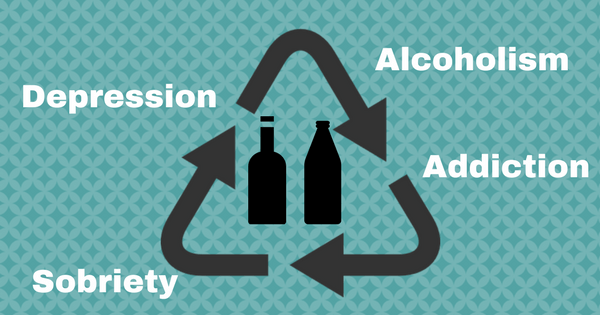Vicious Cycles of Sobriety

Addictive behaviors serve as a way to avoid the unpleasant symptoms associated with depression, anxiety, alternating mood swings, and other psychiatric disorders. Many addicts experience the vicious cycles of sobriety, whereby they have an inability to cope with the surges of their intolerable feelings and unstable emotions. These surges and triggers drive them back to their addictive behavior. This vicious cycle worsens the symptoms of their co-existing psychiatric disorder.
Alcohol addiction and depression appear inextricably linked, and it isn’t difficult to see why. Nearly half of the individuals who suffer from clinical depression have a co-occurring addiction to alcohol. A causal link between the two disorders has been identified in ongoing epidemiological studies as well as genetic factors that appear to influence whether someone who is addicted to alcohol is likely to develop clinical depression, and the other way around. In fact, studies show that the presence of alcohol addiction or depression triples the risk of a person developing the co-occurring disorder. And statistically, a woman is more likely to develop depression first, then begin using alcohol; whereas a man is more likely to use alcohol and subsequently develop depression.
Alcohol directly impacts the same biochemical processes and hormones related to depression, so an alcohol dependency can rapidly cause or increase symptoms of depression. And because alcohol is a readily available drug used by people to “numb” pain or “drown sorrows,” it becomes the drug of choice for those who suffer from depression first.
For someone who relies on alcohol to cope with depression, the ill-health consequences are disastrous. Alcohol can exacerbate the symptoms of depression and lead to self-destructive thoughts and actions. Researchers are examining the brain’s limbic system to determine exactly why alcohol has this compounding effect. Scans of the human brain in patients already suffering from clinical depression show how the limbic system, responsible for regulation of stress hormones, emotions, sexual desire, and sleep, differs from a healthy individual. Alcohol further alters this mood-regulating system, fueling a downward spiral of the deterioration of physical and emotional well-being.
Addiction, Depression, And Genetics
Early epidemiological studies also revealed close relatives of those suffering with co-morbid occurrence of alcohol addiction and depression also suffered a higher incidence of addiction and depression, than control groups, indicating some genetic factor is involved.
Researchers identified a connection to genetic variables located in Chromosome 1 that contribute an increase in a person’s vulnerability to alcohol and depression. With a few thousand genes connected with this chromosome alone, the right genetic combination might make someone more likely to experience clinical depression, or suffer depression as a result of being more likely to become dependent on alcohol, and in some cases, both the disease and disorder can emerge simultaneously.
Stop The Cycle Of Alcohol Dependency And Depression
Understanding the vicious cycle of alcohol addiction and depression is one step to ending the cycle of abuse. Treatment options best suited for someone entering drug rehabilitation will likely include cognitive-behavioral therapies aimed at helping someone learn new coping strategies to deal with the depression, so as to cease the cycle of dependency.
Historically, alcohol dependency would be treated first, so doctors could more accurately assess the depression and safely prescribe medications for the disorder. However, that view is changing. Because a mood disorder can dramatically impair continued sobriety, the simultaneous treatment of both the disease and disorder is recommended.
More aggressive treatment might utilize drugs like naltrexone, an opioid antagonist used to reduce the severity of withdrawal symptoms and manage alcohol cravings, in combination with an selective serotonin re-uptake inhibitor (SSRI) antidepressant medication. This aggressive treatment option stabilizes more rapidly and further prevents depression from resulting in relapse.
Alcohol Abuse And Depression Linkage
It isn’t always easy to ascertain whether substance abuse initiated a depressive episode or developed as a result of the mental disorder first. Complicating matters, the common signs for depression that include anxiety, feelings of hopelessness, difficulty concentrating, or a loss of interest in hobbies are also symptoms of substance abuse. Instead, doctors and treatment professionals must rely on known risk factors, indicators from interviews with the patient, and in some cases, presume a course of action that addresses these common co-morbid conditions.
Today researchers understand that genetic predisposition to alcohol abuse and depression are closely linked and affect the same regions of the brain. Other risk factors for substance abuse and depression include environmental factors including past physical or sexual trauma as well as exposure to family dysfunction and alcohol or drug-use at a young age. Significant stress or other life changes, as well as feelings of isolation following the end of a relationship, or loss of a job, can also trigger depressive episodes as well as substance abuse. Socioeconomic conditions also play a role in both the disorder and rates of alcohol abuse. Gender also offers key risk factors as women metabolize and are affected by alcohol differently than men. They are also twice as likely to suffer from depression than their male counterparts.
At NOVO Detox, we believe that one of the reasons relapse in early sobriety is so common is that addicts are dealing with untreated anxiety, depression and insomnia. NOVO Detox treats the underlying psychiatric issues simultaneously with addiction, accompanied with CBT, EDMR, Mindfulness and a psycho-educational approach at the onset of detoxing to initiate a stronger foundation which supports a lasting recovery.




